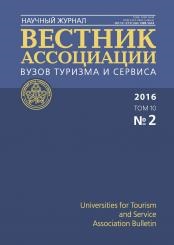Volgograd, Russian Federation
The social apathy system came after the dissolution of the Soviet Union and the destruction of the ideological; the recognized moral values, which had been universal for the Soviet people, disappeared. Representation of members of a society about the absolute and unchanging moral principles were not relevant, in this regard, the society grew into a community consisting of small groups, the main idea of which was the satisfaction of personal needs, often unrelated to the needs of society in general. This article focuses on the possibilities of tourist activity in the Patriotic education of citizens. Today the technology of tourism, in the sphere of pedagogical influence, is mainly used in the practice of Patriotic education of the younger generation. However, the volume of tourism impact and its broader educational opportunities cannot and should not be limited exclusively with Junior and youth direction. In modern society there is a need of using the potential of tourist activities in the sphere of Patriotic education not only of youth but also the adult population. Today there is a need for a focused educational process in patriotism, not beyond a reasonable and humanistic perception of reality. Means of tourist activity of cultural-cognitive orientation such as excursions and travel, priority aimed at acquainting with the history and culture of the Motherland, can be an effective tool in the process of Patriotic education.
tourism, education, formation, patriotism, tourism resources, recreation potential, cognitive activity
1. Babkin A.V. Spetsial´nye vidy turizma M: Sovetskiy sport, 2008. 252 s.
2. Efremova G. Patrioticheskoe vospitanie shkol´nikov. Vospitanie shkol´nikov. 2005. № 8.
3. Il´kevich S.V., Sakharchuk E.S. Ekonomicheskie aspekty ustoychivogo razvitiya turizma v regionakh Rossiyskoy Federatsii. Vestnik Assotsiatsii vuzov turizma i servisa. T. 8. 2014. № 2.
4. Krotova N.V. Kontseptsiya razvitiya turizma v Rossii: novoe videnie i perspektivy. Vestnik Moskovskogo gosudarstvennogo universiteta kul´tury i iskusstv. 2007. № 4. S. 8-12.
5. Kuznetsova M.F. Mentalitet kak modeleobrazuyushchaya konstanta. Vestnik Krasnoyarskogo gosudarstvennogo pedagogicheskogo universiteta im. V.P. Astaf´eva. 2011. № 4 (18). S. 192-195.
6. Kurmaev T.E. Formirovanie patriotizma molodezhi sredstvami turistsko-rekreatsionnoy deyatel´nosti: Dis.… kand. ped. nauk. Kazan´, 2015. 245 s.
7. Loyko O.T. Turizm i gostinichnoe khozyaystvo. Uchebnoe posobie. Tomsk: Izd-vo TPU, 2007. 152 s.
8. Lykova T.R. Patrioticheskoe vospitanie v protsesse kul´turno-poznavatel´nogo turizma. Kul´tura i obrazovanie. Oktyabr´, 2014. № 10. [Elektronnyy resurs]. URL: http://vestnik-rzi.ru/2014/10/2362 (data obrashcheniya: 10.04.2016).
9. Opolchenova E. Problemy razvitiya natsional´nogo turizma. Turizm: praktika, problemy, perspektivy. 2006. № 7. S. 32-33.
10. Chiganova E.A. Tsennostnyy motiv poznavatel´noy deyatel´nosti lichnosti kak predmet teoreticheskogo analiza. Vestnik Krasnoyarskogo gosudarstvennogo pedagogicheskogo universiteta im. V.P. Astaf´eva. 2015. № 1 (31). S. 166-172.
11. Barros J.C. A Projecção do Quotidiano no Turismo e no Lazer, Lisboa, Instituto Superior da Ciências Sociais e Políticas. 2004-216 p.
12. Cavaco C. «A diferenciação regional da função turística», In Geografia de Portugal. Actividades Económicas e Espaço Geográfico (vol.3), Lisboa, Círculo de Leitores, Lisboa-2005, 394 p.
13. Didascalou E. et al. «Wellness tourism: evaluating destination attributes for tourism planning in a competitive segment market», Tourismos. 2009, Volume 4, nº. 126 p.
14. Jose Miguel Rodriguez «Analisis de la competividad de Espania como destino turistico». Madrid: ACCI, 2015. 356 p.
15. Paulo Carvalho «Turismo e desenvolvimento estudos de caso no centro de Portugal». TOMAS; departamentode Geogrofia eCEGOT. Facultad de letras. Universidad de Coimbra, Portugal, 2014. 106 p.
16. Silva S. O Turismo de Saúde e Bem-Estar. Uma Estratégia de Desenvolvimento para a Região Centro, Tese de Mestrado em Geografia (Ordenamento e Desenvolvimento), Universidade de Coimbra, Coimbra. 2010. 243 p.
17. Violante Martinez Quaintana «Turismo y ocio en las soiedades: dinamismo, desarollo turistico y riesgos». Espana, Ediciones Academicas. 2011, 564 p.
18. Yoaguin Maio «Libro blanco: Titulo de grado en turismo». Universidad de Girona, agencia Nacional de Evaluacion de la calidad y Acreditacion, Madrid. 2004. 258 p.





